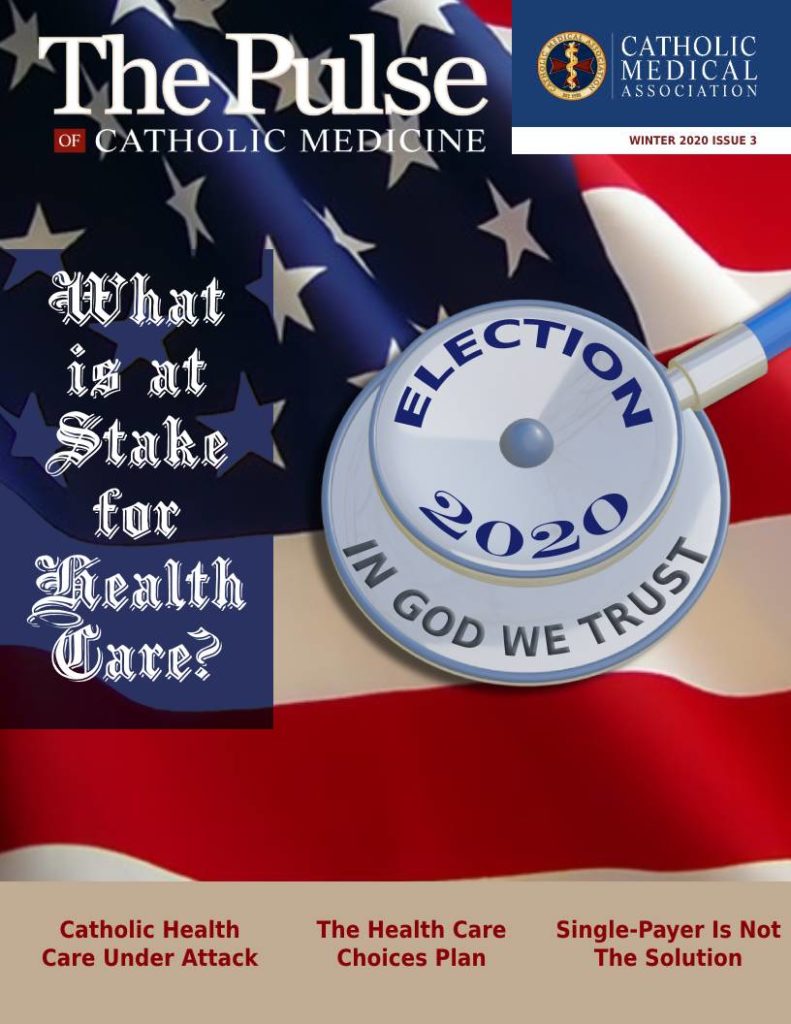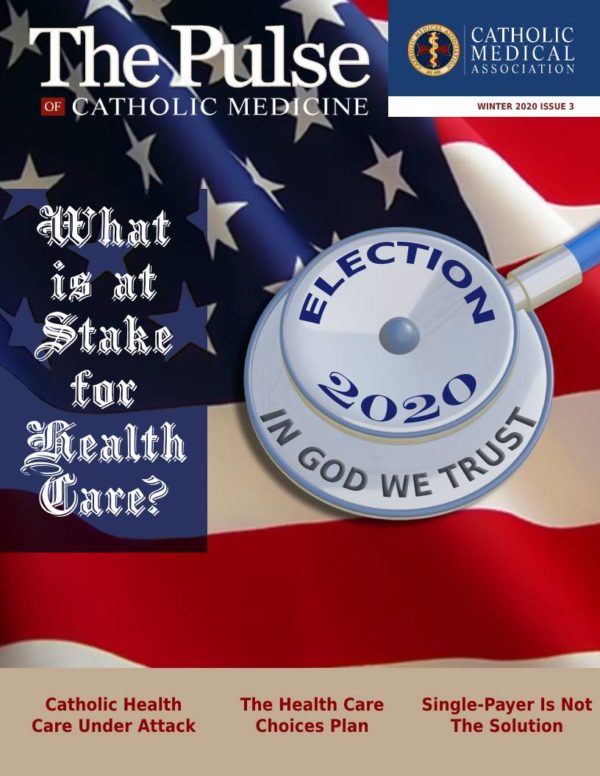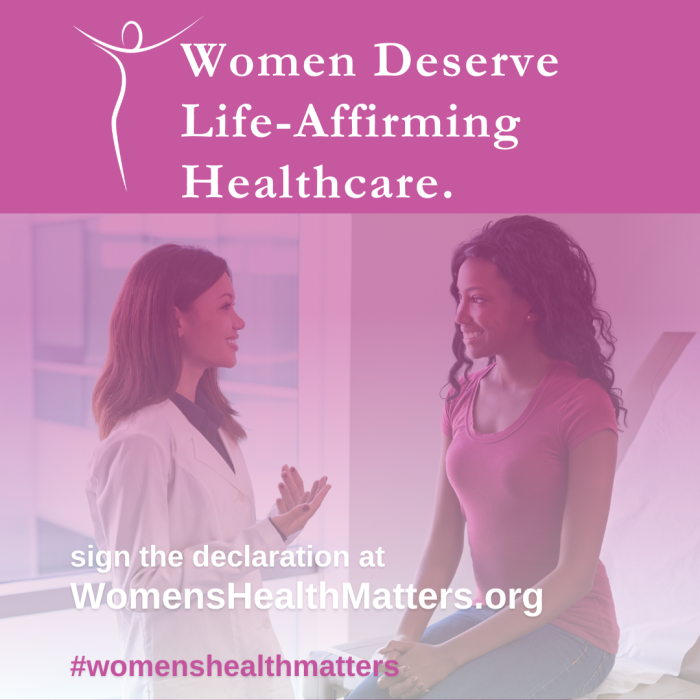https://www.cathmed.org/pulse/2020-winter/

The FIAMC team has selected these articles as very interesting for the members of our Worldwide Federation:
CMA-USA President’s Letter
Dear CMA Members and Friends,

Our society faces challenges which call for a coordinated response from like-minded organizations. There is a growing realization that significant government intervention cannot solve the issues we face, especially in health care.
The Catholic Medical Association is uniquely qualified to respond to these challenges because our faith compels us to be the “Good Samaritan” to our brothers and sisters as we encounter Christ suffering in each patient. The Church also offers us the Catholic social doctrine which can guide health care reform to achieve dignified health care for all.
Through the Health Care Policy Committee, the CMA has promulgated the “12 Principles of Health Care,” which serve as a blueprint for restoring life-affirming health care and protecting freedom of conscience and religion. Chair Dr. Steven White explains these principals in his article, “What is at Stake for Health Care.”
A firm commitment to human dignity, subsidiarity, solidarity, and the common good is integral to health care reform. Authentic Catholic health care defends life and religious liberty, and ensures access to affordable medical care especially for the socioeconomically disadvantaged and marginalized. Also integral to health care reform are the free-market principles of voluntary exchange between willing parties with minimal government intervention.
In this issue of The Pulse of Catholic Medicine, you will read about one solution that embodies these principles, offered by Grace-Marie Turner of the Galen Institute. In her article “A New Generation of Health Reform: The Health Care Choices Plan,” she explains that the Health Care Choices Plan is a genuine alternative to the Affordable Care Act. In addition, Heritage Foundation fellow Robert Emmet Moffit, Ph.D., gives an honest and thorough assessment of the problems with single-payer health care, and Louis Brown, executive director of Christ Medicus, clearly explains that Catholic health care is under attack.
The guild-based nature of our organization gives us the ability to help fight current attacks on religious freedom and the dignity of human life at the local level. At the national level, we are developing strategic partnerships with organizations such as those that are featured in this issue, which share our common beliefs so that we can leverage resources, talents, and relationships to effect significant long-term change in health care consistent with Catholic principles.
After reading the invaluable information found in this issue, pray and discern how you can be a change agent in health care; first, by how you will vote in the 2020 elections, and second, by joining us at the CMA so you too can become part of the new future of health care.
Sincerely in Christ,

Michael Parker M.D.
…………………………………………………………….
A Critical Moment for Conscience Protection
BY MICHAEL E. MCCARTHY
There is perhaps no more exciting time for a medical student than the transition from the preclinical to clinical years. Beginning hospital rotations with years of lectures and the all-important Step 1 exam in the rearview mirror, students finally transform all those hours of studying into concrete action. However, for Catholic students, there is also a nagging unease around certain rotations where our Catholic faith places us in direct opposition to common practices of physicians.
Fortunately for American health care workers, we have legal assurance of conscience protection. Founded on the First Amendment right to free exercise of religion, one can find conscience clauses baked into numerous medically relevant laws of recent decades. These civil rights clauses protect health care workers (and religious health care systems) from being compelled to violate their religious beliefs at work. However, in practice this does not mean that peers, coworkers, and superiors have to be happy about it. There are numerous horror stories of responses by attending physicians when students inform them of their religious objections, ranging from mysteriously poor grades at the end of the rotation to “professionalism” violations, and even students being told point-blank that they have no place in medicine.
While there always has been a debate on the proper balance between the right to conscientiously object and the obligation to care, the intensity of recent attacks on conscience rights have sharply increased over the months leading up to the 2020 presidential election. The most directly threatening development for Catholic medical workers is the recent Supreme Court ruling that expanded the scope of sex-based discrimination to include gender identity. This decision rapidly led to the halting of a new federal rule which strengthened protections for physicians and religious health care systems. The reversal of this rule would leave Catholics open to charges of sex discrimination if they object to abortion and gender reassignment procedures. The rule remains in limbo until further court review.
Beyond the field of medicine, threat to curtail religious freedom has been a focus for certain politicians running for the highest federal offices. Vice presidential nominee Sen. Kamala Harris and Sen. Mazie Hirono made headlines when they claimed that Brian Buescher, a federal judicial nominee, was unfit for office. The senators accused Buescher of “bias” on account of his membership in the Knights of Columbus, citing the Knights’ upholding of Catholic teachings “oppos[ing] a woman’s right to choose” among other “extreme positions.” More recently, Sen. Harris’ running mate, former Vice President Joe Biden, joined in with promises to again send the Little Sisters of the Poor to court if elected president, despite the recent Supreme Court ruling exempting the nuns from the Affordable Care Act’s contraception mandate.
These recent judicial actions and saber-rattling send a single, clear message to Catholics: your faith is not allowed to influence your actions in the workplace or public square. Or course, this is in direct opposition to the foundational tenents of American democracy. In his 1796 farewell address, George Washington asked, “Where is the security for property, for reputation, for life, if the sense of religious obligation desert the oaths which are the instruments of investigation in the courts of justice?” before concluding that, “reason and experience both forbid us to expect that national morality can prevail in exclusion of religious principle.”
Effects of explicit efforts to weaken the right to free exercise of religion are exacerbated by many of the highest profile Catholics in civic life, who have largely adopted this philosophy of a buffered faith that does not translate into action. This is especially true on issues of life and the family, which have become increasingly unpopular in the national political discourse. These politicians and thought leaders are looked upon by others as the model of what one might expect from Catholics in the workplace, thereby weakening everyday workers’ appeals to religious liberty when objecting on moral grounds.
This tide against conscience protection rights and religious liberties strikes the medical field at an inopportune time due to rapid changes in clinical practice and health care delivery over recent years. Physician autonomy has eroded as large corporate health care systems have supplanted most private practitioners. Health care delivery has become more transactional, with “providers” merely offering a menu of services to their “customers” (i.e., patients). Utilitarian ethics dominate laws, hospital policies, and medical education, leading to a new wave of young physicians who only know (and therefore, accept) this brave new world of medicine. Many students and physicians fear that unless something is done to re-empower doctors who are faithful to their religion and the Hippocratic Oath, our health care system will soon resemble that of our northern neighbors, where Catholic physicians and hospitals are now legally required to violate their most central beliefs by participating in assisted suicide, abortion, and the provision of contraception.
In the Academy Award-winning film, A Man for All Seasons, St. Thomas More memorably quips, “When statesmen forsake their own private conscience for the sake of their public duties, they lead their country by a short route to chaos.” The same can be said for physicians, who serve the public within a sacred social contract. For decades, innumerable Catholic health care workers have courageously stood steadfast for the Truth despite a culture and health care system increasingly indifferent to human dignity. It has never been the easy, comfortable path, but it is the one true to our consciences and has had the ultimate support of law. Now, we are in a landscape where it is conceivable that such support may soon recede. Like More, Catholic physicians do not go out seeking confrontation, but nevertheless we find ourselves in a fight for the right to exist as faithful Catholics in health care. While transformational change must occur at multiple levels of health care, including medical education, hospital administration, and national associations, perhaps the most immediate opportunity is at the polls in November.
Michael E. McCarthy is a second-year medical student at Sidney Kimmel Medical College (Jefferson) in Philadelphia. He is a graduate of the University of Pennsylvania and currently serves as the ethics representative on the CMA-SS Advocacy Committee.
For further information on conscience protection laws, please consider episode #13 of the CMA’s “Doctor, Doctor” podcast, an interview with Ariana Grossu of the Department of Health & Human Services.






